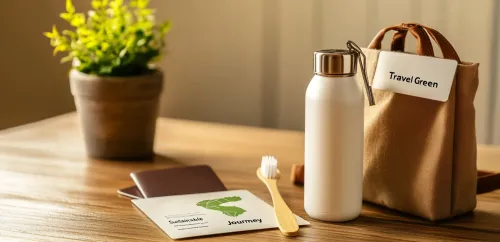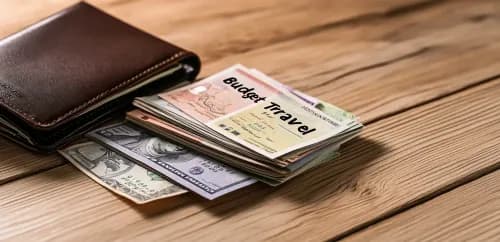Winter Travel Tips: Protecting Yourself Against Weather-Related Cancellations

Destination (from India)
Dates of Travel (optional)
List of Content
- •The Impact of Winter Weather on Travel
- •Common Weather-Related Challenges
- •Proactive Planning Strategies Stay Informed
- •Flexible Booking Options
- •Packing Essentials
- •Warm Clothing
- •Travel Comfort Items
- •Chargers and Power Banks
- •Additional Packing Tips
- •Know Your Rights as a Passenger
- •Safety Precautions While Traveling
- •Conclusion
- •FAQs
The Impact of Winter Weather on Travel
Travel arrangements, especially air travel, are greatly impacted by winter weather. The National Oceanic and Atmospheric Administration (NOAA) reports that significant aircraft delays and cancellations are caused by winter storms. According to a study by the Bureau of Transportation Statistics, around 30% of all flight cancellations in the US during the winter months were caused by winter weather.
Proactive Planning Strategies Stay Informed
Keeping yourself updated on the status of your flight and the weather in the places you’ll be visiting is one of the most important things you can do when travelling in winter. Here's how to always stay informed:
- Download Airline Apps: The majority of airlines now have mobile apps that offer real-time flight status updates, gate adjustments, and even rebooking alternatives. You can avoid standing in line for hours to obtain updated information by using these apps. For example, passengers can monitor their bags and get push notifications regarding flight changes by using the Delta app.
- Check Weather Forecasts: AccuWeather and other reputable weather apps, such as the National Weather Service, offer thorough and precise updates. According to a study by AAA, travellers who routinely check weather forecasts are 40% less likely to have unforeseen travel delays.
- Sign Up for Alerts: By signing up for airline or airport alerts, you can get text or email notifications about cancellations or delays, which will give you plenty of time to change your plans.
Flexible Booking Options
Flexibility can save you from significant stress if your plans are disrupted. Here are some strategies to build flexibility into your bookings:
Book Direct Flights: Nonstop flights lessen the chance of missing connections while there are delays. Research indicates that during winter storms, flights with layovers are more likely to become stranded in an interim airport.
Travel Off-Peak: You can greatly lower your risk of delays by booking your flight during off-peak hours or on less congested travel days. For example, early morning flights often leave on schedule because the plane has probably been at the airport all night and is not impacted by the weather.
Consider Refundable Tickets: Although a little more costly, refundable tickets or travel insurance that covers cancellations can provide security in unpredictable weather.
Packing Essentials
Packing thoughtfully is crucial for winter travel when dealing with delays and avoiding discomfort.
Warm Clothing
The best strategy to stay warm and temperature-adaptable is to layer.
Incorporate:
- Thermal undergarments that don't add bulk while retaining body heat.
- Socks that absorb moisture to keep your feet dry when exposed to snow.
- A heavy-duty winter coat that protects against frigid temperatures by being insulated and water-resistant.
Travel Comfort Items
Although delays are often inevitable, the following comfort items might help make the wait more tolerable:
- Travel blanket and pillow: Smaller ones are excellent for spontaneous naps in waiting rooms.
- Healthy Snacks: Trail mix, dried fruits, or granola bars are great ways to prevent hunger during long delays.
Chargers and Power Banks
Keeping your gadgets charged is essential for both entertainment and communication. Even in airports with few charging stations, a high-capacity power bank guarantees that you stay connected.
Additional Packing Tips
1. Hydration Supplies
Dry air in airline cabins can cause dehydration, weariness, and discomfort. Bring a water bottle that is refillable to stay well-hydrated and save money. Many airports now have water refill facilities, making it easier to replenish following security checks.
2. Skin Protection
Cold temperatures, coupled with low cabin humidity, might cause your skin to dry out. Pack travel-size moisturisers, lip balm, and sunscreen in the carry-on bag. Look for moisturising elements such as hyaluronic acid to keep your facial skin hydrated during the travel.
3. Emergency kit
Prepare a first-aid kit, including bandages, medicines, and antiseptic wipes. Add hand warmers for added comfort, especially during delays in frigid conditions. A tiny flashlight and extra batteries are also helpful in case of an emergency.
Know Your Rights as a Passenger
It can be difficult to navigate airline policies during delays or cancellations, but being aware of your rights as a passenger keeps you informed and empowered in these circumstances. The difficulties of winter travel disruptions can be reduced by being aware of the regulations that airlines must follow.
1. Right to Information
Legally, airlines must notify customers in a timely manner about any delays, cancellations and rebooking possibilities. This entails being transparent about the cause of the interruption and any actions being taken to fix it. To inform passengers, the majority of airlines now employ text notifications, email, or mobile apps. You can be prepared to tackle changes to your vacation arrangements by keeping an eye on these channels.
2. Right to Assistance
You might be eligible for meal coupons, lodging or ground transportation, depending on the duration of the delay and the airline's policies. For example, airlines are required by European Union legislation under EC 261/2004 to offer certain amenities following a delay of two hours or longer. Airlines in the US have different support programs, but most of them involve offering resources during prolonged delays. You can get the right assistance if you are aware of these offers beforehand.
3. Right to Refund or Rebooking
Passengers usually have the choice of rebooking on a different flight or receiving a complete refund in the event of a flight cancellation. Regardless of the kind of ticket, airlines are required by U.S. Department of Transportation regulations to quickly reimburse passengers if a flight is cancelled. To prevent extra fees, make sure you check these details with the airline.
By being aware of these rights, you can be more assertive when necessary, which can lessen the annoyance of winter travel delays.
Managing Delays Effectively
Even the best-laid preparations cannot ensure a delay-free wintertime voyage, but how you handle these delays can have a huge impact on your trip. With a proactive attitude, you may make a stressful situation more manageable.
Stay hydrated and well-fed
Long wait times might be detrimental to your health. Dry air in airports and aircraft can cause dehydration, so bring a refillable water bottle and use airport refill stations as needed. Food alternatives may become restricted during long waits, so investigate airport eating options ahead of time. In addition, food like nuts or protein bars should be brought to keep hunger away during extended delays.
Prepare for long waits
Delays sometimes feel forever, but keeping entertainment readily at hand can help occupy the time more comfortably. Before your journey, download audiobooks, e-books, or movies, and think about investing in noise-cancelling headphones to create a more relaxing environment. For families, pack small toys or activities that will keep children engaged and reduce stress.
Consider travel insurance
Travel insurance might be a financial saviour during the winter months. Comprehensive insurance frequently covers cancellations due to inclement weather, missing connections, and additional costs such as staying the night or meals while delayed. Look for insurance that includes travel interruption coverage, which ensures you are compensated for unexpected expenses if a disruption occurs. Reading the fine print of your insurance before purchasing ensures that you understand what is included and are confident in claiming benefits when necessary.
Safety Precautions While Traveling
Winter travel poses challenges, and safety should always be prioritised. Whether you'll be flying or driving, taking additional measures can help ensure a pleasant and safe journey.
1. Dress appropriately
Proper winter gear is essential for remaining warm and safe from the weather. Layer garments to adjust to shifting indoor and outdoor temperatures. Begin with a moisture-wicking base layer to keep sweat off your skin, then add an insulating layer such as fleece or wool, and finally, a waterproof outer layer to protect against snow and rain.
Accessories are important: Remember to wear insulated gloves, a hat, and a scarf to protect exposed skin. Thermal socks and waterproof footwear with strong traction are required for walking on icy terrain.
2. Be cautious on icy surfaces
Icy walkways, airport runways, and parking lots can be hazardous.
Footwear: To lessen the danger of falling, choose non-slip shoes or boots with strong traction.
Movement: Take short, careful steps and use railings when appropriate.
Vehicle Safety: When driving, keep all windows, mirrors, and lights clean of snow and ice for better vision.
3. Carry emergency supplies.
Having an emergency pack on hand can be life-saving during winter travel, particularly on road journeys.
-Food and water: Bring nonperishable snacks such as granola bars and water bottles.
Warmth Essentials: Pack blankets, hand warmers, and additional layers to keep warm if you become trapped.
-First Aid and Tools: A flashlight with extra batteries, a small shovel, jumper cables, and a basic first-aid kit are essential. A completely charged power bank is also needed to keep devices operating.
Road Trip Safety Tips
Driving in winter conditions requires careful planning and preparation.
1. Know Your Route: Plan your journey in advance and stay informed about weather conditions and potential road closures. A physical map is an invaluable backup if GPS signals are lost or devices fail.
2. Winter Survival Kit: Beyond the essentials like food and water, including tools like tyre chains, an ice scraper, and antifreeze to handle snowy or icy conditions. Keep sand or kitty litter in the car to provide traction if your vehicle gets stuck.
3. Vehicle Maintenance: Ensure your car is winter-ready by checking the battery, tyres, and antifreeze levels. Regular maintenance can prevent breakdowns in harsh conditions.
4. Stay Connected: Inform someone about your travel plans, including your estimated arrival time, so they can check on you if needed.
5. Keep Your Gas Tank Full: Refuel often to avoid running out of fuel, especially in remote areas. A full tank ensures your heater can run if you’re stuck and prevents fuel lines from freezing. Experts recommend maintaining at least a half-full tank throughout winter travel.
Stay Alert and Flexible
Winter conditions can change rapidly. Always monitor weather updates and road conditions and be prepared to adjust your plans for safety. By following these precautions, you can reduce risks and enjoy a more secure winter travel experience.
Conclusion
Winter travel presents unique challenges that require careful planning and preparation. By staying informed about weather conditions, choosing flexible booking options, packing essential items, understanding passenger rights, managing delays effectively, and taking safety precautions while travelling or driving, travellers can significantly reduce the stress associated with winter travel disruptions. So, whether you're travelling for leisure or business, following these strategies will help ensure a safe and enjoyable journey.
FAQs
Q.1 What types of weather-related cancellations are covered by travel insurance?
Most travel insurance policies cover cancellations due to severe weather events such as storms, hurricanes, blizzards, and extreme heat waves. However, it's essential to review your specific policy for any exclusions or limitations regarding coverage for these events.
Q.2 How can I protect my electronics from the cold?
A.2 Keep devices close to your body to retain heat, use insulated cases, and carry a portable charger since cold weather can drain batteries quickly.
Other topics





